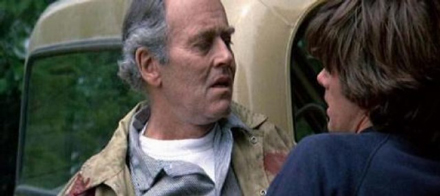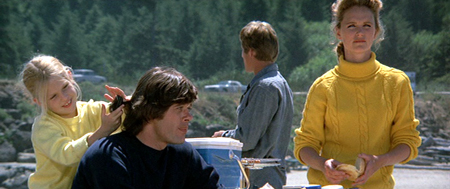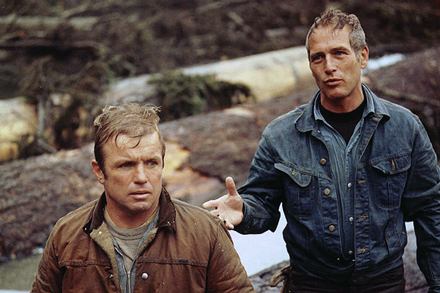
 |
|
|
|
In the four years between his big hits Butch Cassidy and the Sundance Kid and The Sting, top star Paul Newman and his producer John C. Foreman made one movie after another that didn't click: WUSA, Pocket Money The Mackintosh Man. All had good qualities, but the most promising was 1970's Sometimes a Great Notion, an adaptation of a novel by Ken Kesey, acclaimed author of One Flew Over the Cuckoo's Nest. After the original director dropped out Newman finished and signed the film as his second directorial effort. The title is a lyric from the folk song Goodnight Irene, with the 'notion' being to "jump into the river and drown." One character has contemplated suicide, and an entire family fights to keep their house from being swallowed by an ever-widening river. The picture can boast a great cast fully engaged in a compelling drama with strong elements of action and danger. It also takes an honest look at the divisive topic of labor union strikebreakers. 
The story is set in the beautiful woods of the Northwest. Old Henry Stamper (Henry Fonda) runs the Stamper clan, which consists of his two sons Hank and Joe Ben (Paul Newman & Richard Jaeckel) and their respective wives Viv and Jan (Lee Remick and Linda Lawson). The Stampers are 'gyppo loggers', independents that cut and sell wood by volume rather than work for a logging company for a wage. The company employees are on strike but Henry Stamper keeps working, convinced that he's not responsible for the jobs of his neighbors. In this family Henry's word is law: Hank and Joe Bob go along with Pop and their wives stay out of the issue entirely. Arriving from back East is a third son, Leeland (Michael Sarrazin), whose mother (Henry's second wife) fled the family years ago. Leeland's presence changes the family dynamic, as his mother committed suicide and he may be hiding a deep grudge. Leeland takes the expected guff for his long hair and impresses his brothers by his willingness to learn and work hard. His talks with Viv cause her to question her own passive role as Hank's wife. A subtle conflict forms between Hank and Leeland. One reason that Leeland got an education was the monetary support from home. It was provided not by Henry but by his brother Hank -- who slept with Leeland's mother when he was 14. Sometimes a Great Notion is about how family identity clashes with social values. Henry Stamper never got help from anybody (or so he sees it that way) and feels no obligation to help his union neighbors. His idea of independence means doing whatever he wants, and to hell with the rest of the world. The family pecking order is a pure patriarchy. The old bull Henry dictates all; he's so difficult that he drove away two wives. He pushes himself and his clan to the limit and neither Hank nor Joe Ben will openly challenge him. Otherwise the family has a veneer of harmony. Joe Ben and Jan are born-again Christians and extremely nice people. Hank has a strong ethical nature but doesn't advertise it. The womenfolk and kids might as well be living in the 19th century. Viv and Jan don't speak out at the table and nobody asks for their opinions. When Viv finally does beg her husband to honor the strike, Hank puts her off. At one point Viv asks what it's all for. Henry says "We work, sleep, eat, screw, drink and keep on going, and that's all there is." In other words, Tom Joad has come a long way in a changed America. We see the logging operation in great detail. Armed with heavy machinery and chainsaws, Henry's tiny crew is far more productive than workers of the past. We also see what the logging is doing to the country, as the men must drive through miles of previously cut timber to get to fresh stands of trees. It's a wasteland of ruin. John Gay's screenplay makes no particular ecological pitch. Just the same, audiences of 2012 will be sobered by the sight of a former forest transformed into an endless lumberman's trash heap. 
The characters are extremely well drawn. Henry Fonda is a domineering old bull but not a monster (except presumably to his unlucky wives). Paul Newman seems reasonable but may be just a younger version of his father. Beautiful Lee Remick has a role somewhat like her young widow in Wild River, except that here she has the dissenting Leeland to advise her that it's time to go -- he knows from his mother's own experience. Michael Sarrazin is a good conduit into the Stamper mindset. Since he looks a lot like Peter Fonda, we can be grateful that the part was cast for acting ability over family connections. As a director Paul Newman keep things low-key and naturalistic. Leeland doesn't grab Viv and beg her to run away with him. He instead just says that when she's ready to go, he'll go with her. The best thing about Sometimes a Great Notion is that it is not a pro-union tract. The locals whine and insult the Stampers, and the regional union president who asks Henry for mercy has nothing to offer him but veiled threats. Left unsaid is the plain reason why the Stampers won't help end the strike. If they refused to work and the lumber company caved in, the union might get the concessions they've been striking for. But the Stampers would be out of business for good, as the company would consider them traitors. The Stampers value their right to be independent, while the union will always consider them scabs, the enemies of organized labor. So the issue comes down to an economic clash in which the right to work independently aids employers in exploiting the general work force. There is little love lost between the Stampers and their neighbors, as seen at a football picnic that turns into a brawl. The union men take to acts of sabotage, and Hank and Joe Ben find themselves rescuing a pair of drunks that almost drown while interfering with the logging operation. A local movie theater owner tries to make Hank feel responsible for his woes, and threatens suicide. Irate neighbors burn some of the Stampers' equipment. The dangers of logging work are shown without exaggeration. The enormous trees can fall the wrong way or come loose from the chains that drag them up steep hills. The hazards are real and catastrophe is always a possibility. The Stampers get a full dose of trouble when working alone on a riverbank, away from their heavy machinery. Shattered trees go every which way and all of a sudden two men are down. There's nobody around to ask for help: the full meaning of 'fierce independence' bites back. Viewers never forget the scene that follows. Joe Ben finds himself pinned down by an enormous log, sitting in about a foot of water. But the tide is coming in very quickly, and Hank lacks the right tools to get Joe Ben free. The predicament turns into veteran actor Richard Jaeckel's best career opportunity. He began as a teenage actor playing soldiers in WW2 and had been an effective, competent presence in movies ever since. Jaeckel received an Academy Award nomination for this part. Linda Lawson, by the way, has an earlier bit of marginal fame to her name -- she played the fatal maybe-mermaid opposite Dennis Hopper in Curtis Harrington's creepy Night Tide. 
Sometimes a Great Notion probably had an identity problem with audiences. A country-western ballad is the first thing heard on its soundtrack, but viewers expecting a hee-haw backwoods romp were surely put off by the film's theme of union politics. Say the word 'union' in 1970 and half of America tended to go cross-eyed, like the pigheaded woman in Martin Ritt's Norma Rae who shouts that union people don't like to do honest work. The title Sometimes a Great Notion sounds like a literary conceit that has no direct relation to the film's content. One alternate title used for later TV screenings is Never Give A Inch, Henry Stamper's motto of stubborn independence. It probably would have been a better choice. A superior drama about a subject rarely given even-handed treatment, Sometimes a Great Notion is a woefully underrated show. The relationships in the Stamper family are revealed indirectly, with a minimum of exposition. Paul Newman's restrained and natural direction is to be commended. It may be his best work as a director. Shout Factory's Blu-ray of Sometimes a Great Notion is a good encoding of this colorful, energetic-looking tale set on a rich Oregon river. Some shots are slightly grainy but most of the picture looks great. ALL of it looks infinitely better than the dull pan-scanned copies shown on TV for decades. The plain-wrap presentation features a nice image of the late Paul Newman on its cover. No extras are included.
On a scale of Excellent, Good, Fair, and Poor,
Sometimes a Great Notion Blu-ray rates:
Reviews on the Savant main site have additional credits information and are often updated and annotated with reader input and graphics. Also, don't forget the 2011 Savant Wish List. T'was Ever Thus.
Review Staff | About DVD Talk | Newsletter Subscribe | Join DVD Talk Forum |
| ||||||||||||||||||